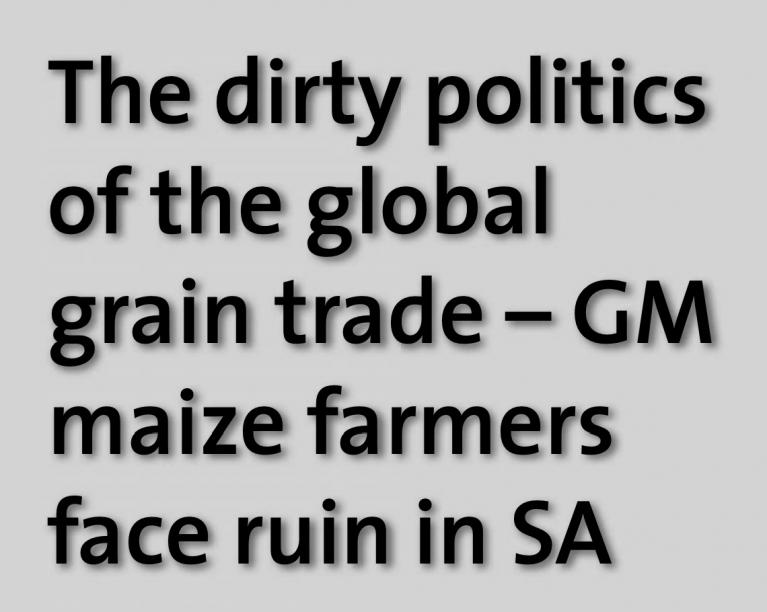Latest Resources

8 September 2010
The dirty politics of the global grain trade – GM maize farmers face ruin in SA
Recently, the South African press reported on the possible bankruptcy faced by maize farmers. The African Centre for Biosafety (ACB) has today released a new report titled “The dirty politics of the global grain trade – GM maize farmers face ruin in SA” which provides an analysis of why South Africa’s record 13 million ton […]

3 September 2010
EIA regulations and GMOs in South Africa
The African Centre for Biosafety (ACB) has done considerable work with regard to the need for environmental impact assessments of GMOs and the limitations of current legislation. This work can be found on the ACB’s website. We have perused the new Environmental Impact Assessment (EIA) Regulations, regulating procedures and criteria for conducting EIAs as set […]

13 August 2010
GM Sorghum: Africa’s Golden Rice
In this paper, we critically analyse the African Biofortified Sorghum (ABS) project, a GM ‘poster project’ in Africa. We dig beneath the veneer of the project being an “African led solution” to poverty and malnutrition on the continent. We also focus attention on the myriad of sorghum research initiatives currently underway in Africa, using both […]

12 May 2010
Traceability, segregation and labelling of genetically modified products in South Africa: A Posit...
South Africa has promulgated national legislation, the Consumer Protection Act (CPA), which creates an opportunity for the mandatory labelling of certain foodstuffs containing or which are genetically-modified organisms (GMOs). The Act sets out a number of consumer rights that have relevance to the sale of products with genetically modified components. These include the right to […]

17 April 2010
Scottish Parliament Motion on GM entry refusal, Kenya, South Africa
*S3M-6119 Bill Wilson: Biodiversity Coalition Opposes GM Contamination. That the Parliament notes reports that 40,000 tons of genetically modified (GM) maize from South Africa have been refused entry to Kenya as a result of protests led by the Kenya Biodiversity Coalition. Further notes, with reference to motion S3M-05873 by Bill Wilson ‘Who Benefits from GM […]

7 February 2010
A profile of Monsanto in South Africa
Monsanto is a globally dominant company in the agrochemical, seed and agricultural biotechnology sector. It has been active in the agrochemicals market in South Africa since 1968, and now owns almost all traits used in the South African GM crop market. Thanks to the purchase of local seed companies, Sensako and Carnia, in the late […]

7 February 2010
Bilateral biosafety bullies: How corporations use bilateral trade channels to weaken biotech regu...
Across the world, the use of bilateral trade instruments to prise open markets for genetically modified (GM) crops is escalating. To expand business overseas, the biotech industry needs stronger intellectual property rules and weaker biosafety standards. Bilateral trade deals are an effective way to do this. This report looks specifically at how the world’s grain […]

5 January 2010
Status of de facto moratorium on GM commodity clearance/import applications in SA
The South African government has granted a large number of commodity import permits over the years, enabling millions of tons of GM maize, soya and canola to be imported into South Africa. However, during September/October 2005, the Department of Trade and Industry (DTI), a member of the Executive Council (EC): GMO Act, raised several concerns […]

17 November 2009
Ongoing Concerns about Harmonisation of Biosafety Regulations in Africa
The paper is a response to concerns raised by the African Union’s Biosafety Unit about assertions made in an earlier briefing in June 2009 regarding the African Union’s biosafety harmonisation processes. In this briefing the Ms Swanby on behalf of the ACB salutes the initiatives taken by the AU in the biosafety discourse on the […]
